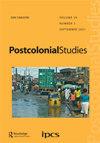Music, empire, colonialism: sounding the archives
IF 1.8
3区 社会学
Q2 CULTURAL STUDIES
引用次数: 0
Abstract
The ‘ sounds ’ and ‘ silences ’ of the colonial archive have long intrigued scholars. Postco-lonial academics, of course, have intensely explored the nuances of archival fragmentation and the ethical issues of archival silencing, and are increasingly applying such questions to decolonial and other interrogative contexts of the twenty-fi rst century. 1 But there is still more to be said about aural sensibilities and their untapped potential for and after the archive. Coming to this special issue from the vantage point of historical musicology – as scholars of music, power and practice who are interested in the impacts and legacies of the British empire from the long nineteenth century through to the inter-war and post-war worlds of the twentieth – we are speci fi cally concerned with how renewed attention to the ‘ sounding ’ of colonial archives may expose, problematize, complicate and indeed resonate with, rising conversations about what might unfold next, archivally, beyond the ‘ archive proper ’ . 2 To this end, we suggest that historical musicol-ogy can provide a creative, if at times frustratingly elusive, arena of enquiry for highlighting the ambiguity of archiving: for through the record-keeping of empire, issues of race, gender and authority were intrinsically but also messily inscribed into decisions about who was represented, who was silenced and who was (un)heard. 3 As a starting point: let us begin with the question of how to study archival silence through the lens of a fi eld historically obsessed with sound . The disciplining ‘ hush ’ of the archive is a void that scholars are becoming ever more anxious to fi ll, and yet, as Saidiya Hartman reminds us, the voyeuristic act of attempting to resurrect and ‘ give voice ’ to the lost archive is problematic in itself, often reinforcing acts of neo-imperial-ism. 4 In light of increasing pressures to have音乐,帝国,殖民主义:探听档案
长期以来,殖民档案的“声音”和“沉默”一直吸引着学者。当然,后殖民学者已经深入探讨了档案碎片化的细微差别和档案沉默的伦理问题,并越来越多地将这些问题应用于21世纪的非殖民和其他疑问环境。但是,关于听觉的敏感性,以及它们在档案前后尚未开发的潜力,还有更多要说的。这个特殊的问题来自历史音乐学的有利位置,作为音乐的学者,力量和实践感兴趣的影响和大英帝国的遗产从漫长的19世纪到20——我们的两次世界大战和战后世界speci fi卡莉关心如何重新将注意力集中到“听”的殖民档案可能暴露,桎梏,复杂化和共鸣,关于接下来可能展开的对话,在档案方面,超越了“档案本身”。为此,我们建议,历史音乐学可以提供一个创造性的,虽然有时令人沮丧地难以捉摸的,探究的舞台,以突出档案的模糊性:因为通过帝国的记录保存,种族、性别和权威的问题本质上是,但也杂乱地嵌入到关于谁被代表,谁被沉默,谁被(不)听到的决定中。作为一个起点:让我们从如何通过一个历史上痴迷于声音的领域的镜头来研究档案沉默的问题开始。学者们越来越渴望填补档案的“沉默”,然而,正如赛迪亚·哈特曼(Saidiya Hartman)提醒我们的那样,试图复活和“发出声音”的偷窥行为本身就是有问题的,往往会加强新帝国主义的行为。鉴于越来越大的压力
本文章由计算机程序翻译,如有差异,请以英文原文为准。
求助全文
约1分钟内获得全文
求助全文

 求助内容:
求助内容: 应助结果提醒方式:
应助结果提醒方式:


